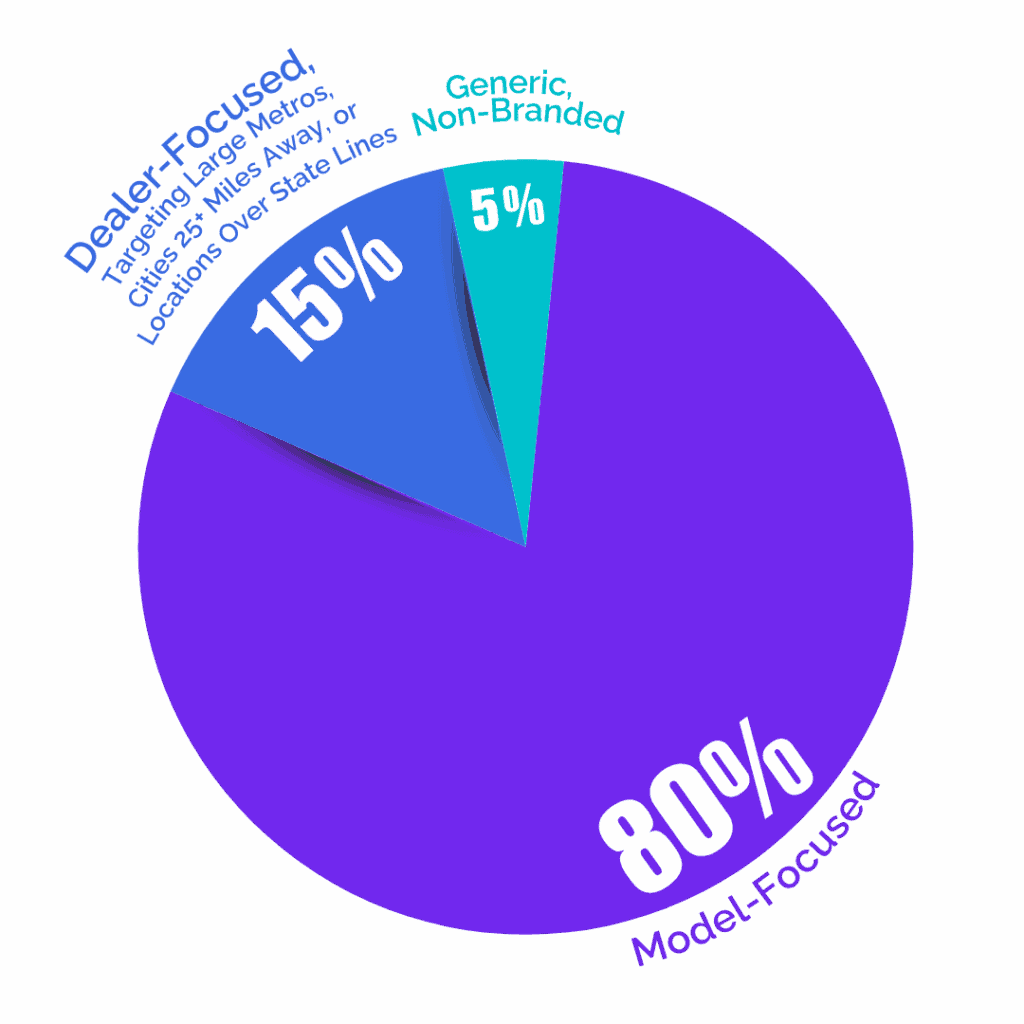
Is your content working as hard as it could be? In the ever-evolving world of search, what worked yesterday might not be enough today. Don’t worry, though. We’ve cracked the code on a more agile approach to SEO, one that embraces shorter, AI-friendly content without sacrificing organic performance.
Our recent case study on 600-word pages coupled with long-form foundational content delivered fast, measurable gains for our automotive SEO clients, proving that less can truly be more in the pursuit of top search engine rankings.
Wikimotive has built its reputation on long-form, high-performing content. So while it might seem counterintuitive for us to explore shorter formats, our research shows that strategically enhancing our long-form pieces with concise, shorter, satellite content can deliver significant benefits for our clients.
Recognizing this immense opportunity, we embarked on a six-month case study to rigorously evaluate the performance of 600-word pages within traditional search. The results were compelling: in numerous instances, this shorter content delivered rapid, measurable gains, mirroring the impact typically associated with our longer-form pieces. Below, you’ll get the details behind our testing methodology and the significant outcomes we observed.
Testing the SEO Impact of Shorter Content
To test the strength of short-piece add-ons, we decided to create 600-word landing pages within our hub and spoke strategy for various clients.
A hub and spoke strategy is where there is one (hub) page that targets a core keyword, like “Chevy dealer,” with multiple pages (spokes) that target more specific keywords, such as “Chevy dealer in Houston” and “Chevy dealer near me,” linking to it. This strategy helps to build the dealer’s authority for that core keyword in various target locations.
It’s important to note that the spoke keywords are generally lower-search-volume subsets of their hub counterparts. So, while the pages can be shorter and rank well, you do need more of them in order to cover the market area and have them add up to a meaningful overall impact in search volume.
When running our test, we continued our 1200-word standard for the hub pages and made the spokes 600 words. We then monitored our clients’ rankings for those core keywords within the targeted geos each month to see what worked, how fast it worked, and what didn’t work at all.
Does Shorter Content Consistently Rank?
Like everything SEO-related, the answer to whether shorter content performs well organically is: it depends. We saw a range of results during our test, but overall, the shorter content worked the majority of the time:
Remember that the standard rule for SEO is that it takes time, so seeing any change at all in the first 30 days is fantastic. The continued improvement over 60 and 90 days is further proof of the pages performing well and of the maintained authority the pages offer over time. Of course, 90 days isn’t the complete tell-all, so while this is an indication of prolonged performance, we will have to continue monitoring to know how solid these pages remain.
Now, what about the pages that still didn’t have an impact after 90 days? There were pretty significant consistencies with the keywords clients didn’t rank as well for with the 600-word pages:
Let’s break down each of these data points.
It’s no surprise that the majority of pages that did not help to improve rankings were model-focused. These keywords, such as “Chevy Equinox for sale” and “Cadillac XT5 for sale,” are much harder to rank for than dealer-focused keywords because there is a lot more competition surrounding them.
While dealer-focused keywords largely pull up results for brick-and-mortar dealerships, model-focused keywords include all of the online car sales sites as well, making it much more challenging to perform. Many of the model-focused geo spokes will likely need to be a bit longer to build enough traction.
The 15% of pages that were dealer-focused and did not perform well were all targeting more challenging areas. Some of those pages were targeting large metros, like Cincinnati or Charlotte, which are going to be more difficult due to the amount of competition.
The rest of the dealer-focused pages that did not have an impact were targeting cities that were 25 miles or more away from the dealership or in another state. This makes sense as the further away a dealership is from the target location, the more challenging it will be to compete with the dealers that are closer in proximity. These pages may need more content added to them.
Finally, the pages targeting generic keywords, like “used cars for sale” and “SUVs for sale,” will likely need some more support. This, similar to the model-focused keywords, is no surprise as there is much more competition for these keywords between online car sales sites and local dealers from all brands.
When it comes down to it, the shorter landing pages worked most of the time. The times in which they didn’t were no surprise, either.
Start Small, Monitor, and Build On When Needed
The proof is in the pudding here; 600 words, when connected strategically to long-form foundational content, is frequently enough to improve your performance in search. The results from our test are a great indicator of alignment between AI-search-friendliness and what performs well in traditional search. This means that you can work on improving your visibility within both at the same time. Plus, shorter content means you can produce more pages at once and cast a net on all of your geo targets, helping you to start building authority immediately.
But what about when it doesn’t seem to be working?
As we know, an essential piece of an SEO strategy is monitoring for success. So, if you find that, over time, some of your pages aren’t performing as well in traditional search, add more content to the page!
You or your content marketing partner should keep the potential need for additions in mind from the get-go when producing content. Always write the content in a way that could easily be added to in the future.
Landing pages with defined sections are easy to add to because each section can be expanded, or more sections can be added. You always want to set yourself up for an easier time in the future, so be prepared for potential content additions.
SEO Is Never One Size Fits All
Like everything in SEO strategy, the length of your content will always depend on a plethora of factors. But in our case study, which monitored the results of 600-word landing pages for various dealerships across the United States, it was proven that shorter content can perform when matched with a long-form foundation.
At Wikimotive, we are always looking for new ways to create dynamic strategies that intentionally combine long-form and short-form content. This approach empowers us to generate a greater volume of high-quality content and achieve superior results for our clients across both AI-driven and traditional search landscapes.If this sounds like something you want to be a part of, contact us today! We’re ready to help you rank for the keywords that matter to you in the places that matter to you.

